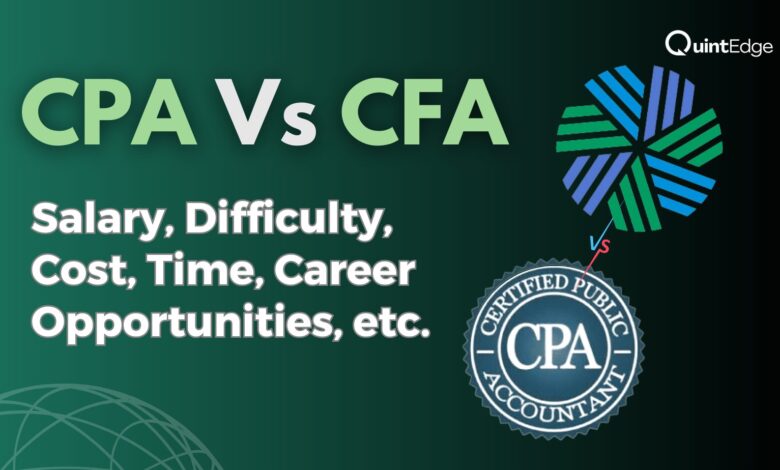CMA vs CFA: Which Course Is More Flexible for Working Professionals?

Choosing the right international finance course, including certifications like CMAs (Certified Management Accountants) and CFAs (Chartered Financial Analysts), can be difficult for working professionals who are looking for sufficient flexibility. But the decision of CMA vs CFA really comes down to whether the certification fits with your time commitments, career aspirations, developing areas of expertise and other distinguishers. Though their topic areas and exam formats differ, both CMAs and CFAs impart strong skills and talents.
The CMA course qualification is generally considered an achievable qualification for professionals working full-time, this largely due to its two-part, management accounting-based approach, exam. Whereas, CFA is vast with a level exam and extensive syllabus that focuses on investment and financial analysis. Determining flexibility in each course helps professionals make informed decisions that support career progress without overwhelming schedules.
What is the CMA Course Qualification?
The CMA course is an internationally recognized qualification provided by the Institute of Management Accountants (IMA), USA. It is specifically focused towards professionals that are looking to develop their career in finance regarding strategic management and management accounting. The CMA course qualification particularly relates to areas such as performance management, cost management, financial planning, and decision analysis.
To qualify for the CMA course qualification, a requisite number of educational and professional requirements must be satisfied by candidates. Candidates will need to provide documentation of a bachelor’s or higher degree and two years of relevant experience in financial management or management accounting. Furthermore, candidates must pass two comprehensive exams that cover areas of financial planning and strategic financial management.
What is the CFA Course?
The Chartered Financial Analyst (CFA) is widely recognized. It serves investment and finance professionals seeking additional knowledge in portfolio management, economics, ethics, financial analysis, and equity research. This course consists of three levels, including complex or specialized topics.
A bachelor’s degree, four years of professional experience, and successful completion of all three exam levels are prerequisites for becoming a CFA charterholder. In addition, this is a designation that is respected in the investment and financial industries, which will lead to roles such as financial analyst, portfolio manager, risk manager, and investment banker.
CMA vs CFA: Key Differences in Both Finance Certifications
When comparing CMA vs CFA, it is essential to understand the differences between the two certifications that cater to varied career paths in finance. Financial research, investment management, and portfolio analysis are the main emphases of the CFA course.
The CMA course qualification focuses on management accounting, internal control and financial planning within organizations. Selecting the right course depends on your career objectives and industry preference.
| Factors | CMA Course | CFA Course |
| Key Focus Areas | Cost Management, Internal Control, and Management Accounting. | Portfolio Management, Equity Research, and Investment Management. |
| Course Duration | 6 to 12 months | 2.5 to 4 years |
| Ideal For | Professionals in Budgeting, Corporate Finance or Accounting. | Professionals in Portfolio Management, Equity Research, and Investment Banking. |
| Exam Frequency | Several windows per year | Level One includes February, May, August, and November. Level Two & Three – Varies by year. |
| Passing Score | 45-50% per part | 40-45% average per level |
| Course Cost | $1,200 to $2,000 (fees and study materials) | $2,500 to $4,500 (including three-level fees and study materials) |
| Continuing Education | Yes, 30 CPE hours per annum | Yes, ongoing professional and ethics learning |
| Career Opportunities | Cost Accountant, Financial Analyst, Controller, and Internal Auditor | Equity Analyst, Fund Manager, Portfolio Manager, and Investment Banker |
CMA vs CFA: Exam Flexibility
When it comes to professional certifications in finance, CMA and CFA courses both hold international recognition. When considering flexibility aspects, the CMA course provides more convenience for working professionals.
CMA can be completed within 12 to 18 months, and candidates can choose exam dates across the year, simplifying it to balance with a full-time job. In contrast, the CFA course is more structured, requiring candidates to pass three levels of exam within fixed windows, which takes 3 to 4 years to complete.
CMA vs CFA: Career Prospects & ROI
CMA course is ideal for professionals aiming for careers in management account, corporate strategy, financial analysis, and budgeting. CMAs often work in leadership roles within organizations, like cost accountants, financial controllers or CFOs. On the other hand, the banking and investment sectors greatly value CFA courses. It opens doors to roles such as equity research analyst, investment banker, portfolio manager, financial advisor, especially in investment companies and asset management organizations.
Talking about ROI, CFA provides high long-term earnings, for those in high-finance roles. However, it requires longer commitment, as candidates must clear all three levels of exams and complete four years of professional experience. On the other hand, CMA is quicker to complete and affordable, leading to a faster career path especially in the corporate setting. Ultimately, better ROI depends on your career goals, CMA for international corporate finance roles and CFA for the investment-centric career.
Conclusion
CMA and CFA, both are valuable certifications, CMA is considered as flexible for working professionals for its shorter exam duration, year-round exam windows and its focus on practical approach and management-level accounting abilities are useful in business settings.
On the other hand, CFA is a well-structured course. It demands longer time commitment and a more stringent exam schedule, which make it less accommodating for individuals seeking to balance pursuing this course with a full-time job. To learn more about finance courses like CMA and CFA syllabus, career scope, exam, connect with our team today!
FAQs
1. Which course provides flexible exam scheduling – CMA or CFA?
CMA provides flexible exam windows throughout the year compared to fixed CFA schedule.
2. Is it easy to balance CMA studies with a full-time job?
Yes, CMA has a shorter duration and includes a focused curriculum, which simplifies managing studies with a full-time job.
3. Can working professionals complete the CMA course quicker than CFA?
Yes, CMA can be accomplished in 12 to 18 months, whereas CFA takes roughly 2.5 to 4 years.
4. Can CMA & CFA exams be rescheduled effortlessly?
CMA exams are easier to reschedule within the next exam window, meanwhile rescheduling CFA exam is limited and demands extra fees.



